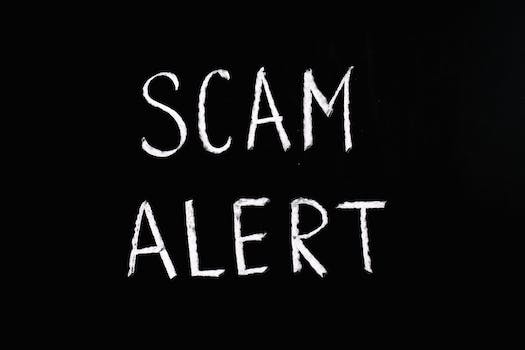

-
Table of Contents
"Stay vigilant, stay secure: Unveiling the secrets to spotting and evading fake check scams."
Introduction
Introduction:
Fake check scams have become increasingly prevalent in today's digital age, posing a significant threat to individuals and businesses alike. These scams involve the use of counterfeit checks to deceive victims into believing they have received legitimate funds. However, once the check is deposited or cashed, victims often find themselves responsible for the fraudulent amount. To protect yourself from falling victim to these scams, it is crucial to be aware of the warning signs and employ preventive measures. In this article, we will provide you with essential tips for detecting and avoiding fake check scams, helping you safeguard your finances and personal information.
How to Spot Red Flags in Fake Check Scams
Tips for Detecting and Avoiding Fake Check Scams
In today's digital age, scams have become increasingly sophisticated, making it crucial for individuals to be vigilant and informed. One prevalent scam that continues to target unsuspecting victims is the fake check scam. These scams can result in significant financial losses and can have a lasting impact on victims. Therefore, it is essential to know how to spot red flags in fake check scams and take necessary precautions to avoid falling victim to them.
One of the first red flags to look out for is unsolicited checks received in the mail or via email. Scammers often send out fake checks to individuals, claiming they have won a lottery or a prize. These checks may appear legitimate at first glance, but upon closer inspection, you may notice irregularities such as misspellings, poor quality printing, or unfamiliar logos. It is crucial to remember that legitimate lotteries or contests do not require winners to pay any fees upfront or provide personal information.
Another red flag to be aware of is when someone asks you to deposit a check and then wire a portion of the funds back to them. Scammers often pose as employers, potential buyers, or even romantic interests, sending victims a check for an amount that exceeds what is owed. They then request the victim to deposit the check and wire the excess funds back to them. This is a classic scam, as the deposited check is usually counterfeit, and victims end up losing the money they wired.
Furthermore, be cautious if you are asked to purchase gift cards or send money through wire transfers as a form of payment. Legitimate businesses and organizations rarely ask for payment in these forms. Scammers often pressure victims into making quick decisions, using fear or urgency as tactics to manipulate them. It is crucial to take the time to verify the legitimacy of any requests for payment and to never share personal or financial information with unknown individuals or entities.
Additionally, be wary of job offers that promise high pay for minimal work. Scammers often target job seekers, offering them positions that require little effort but promise substantial compensation. These offers may involve receiving checks to deposit and then transfer funds elsewhere. Remember, if a job offer seems too good to be true, it probably is. Always research the company and contact them directly to verify the legitimacy of the offer.
To protect yourself from fake check scams, it is essential to stay informed and educated about the latest scams and tactics used by scammers. Keep up to date with news and alerts from reputable sources, such as government agencies or consumer protection organizations. These sources often provide valuable information on emerging scams and offer tips on how to avoid them.
If you suspect that you have received a fake check or have fallen victim to a scam, report it immediately to your local law enforcement agency and the Federal Trade Commission (FTC). By reporting scams, you not only protect yourself but also help authorities track down and apprehend scammers, preventing them from victimizing others.
In conclusion, fake check scams continue to be a significant threat in today's digital world. By being aware of the red flags and taking necessary precautions, you can protect yourself from falling victim to these scams. Remember to be cautious of unsolicited checks, requests for wire transfers or gift cards, and job offers that seem too good to be true. Stay informed, report scams, and help create a safer online environment for everyone.
Essential Tips for Avoiding Fake Check Scams

Tips for Detecting and Avoiding Fake Check Scams
In today's digital age, scams have become increasingly sophisticated, and one of the most prevalent scams is the fake check scam. These scams can be devastating, causing financial loss and emotional distress. However, by being aware of the warning signs and taking necessary precautions, you can protect yourself from falling victim to these scams.
One of the first steps in avoiding fake check scams is to familiarize yourself with the common red flags. One of the most obvious signs is when someone you don't know sends you a check for no apparent reason. Scammers often use this tactic to gain your trust and make you believe that the check is legitimate. Another red flag is when you are asked to deposit the check and then wire a portion of the funds back to the sender. Legitimate transactions rarely require you to send money back immediately, especially if it involves a check from an unknown source.
It is also important to be cautious when dealing with unfamiliar individuals or companies. Scammers often pose as legitimate businesses or individuals to gain your trust. They may use fake websites, email addresses, or phone numbers to make their scam appear genuine. Always verify the legitimacy of the person or company before engaging in any financial transactions.
Furthermore, it is crucial to be wary of overpayment scams. In these scams, scammers send you a check for an amount greater than what is owed and ask you to refund the excess amount. They may claim it was a mistake or provide a plausible explanation for the overpayment. However, once you deposit the check and send back the excess funds, you will discover that the original check was fake, leaving you responsible for the entire amount.
To protect yourself from fake check scams, it is essential to exercise caution when accepting checks as payment. If possible, opt for more secure payment methods such as electronic transfers or cashier's checks. If you must accept a personal check, ensure that it is from a trusted source and verify its authenticity with the issuing bank. Remember, scammers can create convincing counterfeit checks, so it is crucial to be diligent in verifying their legitimacy.
Additionally, it is advisable to be skeptical of unsolicited job offers or opportunities that involve receiving and depositing checks. Scammers often target job seekers by offering lucrative positions that require minimal effort. They may ask you to receive checks on their behalf and then forward the funds to another account. These job offers are typically too good to be true and should be approached with caution.
In conclusion, fake check scams are a prevalent threat in today's digital world. By familiarizing yourself with the warning signs and taking necessary precautions, you can protect yourself from falling victim to these scams. Remember to be cautious when dealing with unfamiliar individuals or companies, and always verify the legitimacy of any checks you receive. Opt for more secure payment methods whenever possible, and be skeptical of unsolicited job offers that involve handling checks. By staying vigilant and informed, you can avoid the financial and emotional consequences of fake check scams.
Common Signs of Fake Check Scams and How to Protect Yourself
Tips for Detecting and Avoiding Fake Check Scams
In today's digital age, scams have become increasingly sophisticated, making it crucial for individuals to be vigilant and informed. One common scam that has been on the rise is the fake check scam. These scams can be devastating, leading to financial loss and even identity theft. To protect yourself, it is essential to be aware of the common signs of fake check scams and take necessary precautions.
One of the most common signs of a fake check scam is when you receive a check for an amount that exceeds what you were expecting. Scammers often use this tactic to lure victims into a false sense of security. They may claim that the excess amount is for taxes, fees, or other expenses, and ask you to wire the difference back to them. However, once you deposit the check and wire the money, you will soon discover that the check was fake, leaving you responsible for the entire amount.
Another red flag to watch out for is when you receive a check from an unfamiliar source. Scammers often send out unsolicited checks, pretending to be a lottery win, a prize, or a job offer. These checks may appear legitimate at first glance, but upon closer inspection, you may notice misspellings, poor quality printing, or even incorrect bank information. If something seems off or too good to be true, it probably is.
Furthermore, be cautious if you are asked to pay for something using a check, especially if the request comes from someone you do not know personally. Scammers may ask you to purchase gift cards, make a payment for an online purchase, or send money for a rental property using a check. Remember, legitimate businesses and individuals typically prefer more secure payment methods, such as credit cards or online payment platforms. If someone insists on a check, it is a warning sign that something may be amiss.
To protect yourself from falling victim to a fake check scam, there are several steps you can take. Firstly, always verify the source of the check before depositing it. Contact the issuing bank directly to confirm the authenticity of the check and ensure that sufficient funds are available. Additionally, be cautious when providing personal information, such as your bank account number or social security number, to anyone you do not know and trust.
It is also important to educate yourself about the different types of scams that are prevalent today. Stay informed about the latest scams and learn how to recognize the warning signs. Many government agencies and consumer protection organizations provide resources and information on their websites to help individuals protect themselves from scams.
Lastly, trust your instincts. If something feels off or too good to be true, it probably is. Scammers often use high-pressure tactics to rush you into making a decision. Take your time, do your research, and consult with trusted friends or family members before taking any action.
In conclusion, fake check scams are a serious threat in today's digital world. By being aware of the common signs of these scams and taking necessary precautions, you can protect yourself from financial loss and potential identity theft. Remember to verify the source of any checks you receive, be cautious when providing personal information, and stay informed about the latest scams. Trust your instincts and take the time to make informed decisions. With these tips in mind, you can navigate the digital landscape with confidence and avoid falling victim to fake check scams.
Q&A
1. What are some tips for detecting fake check scams?
- Be cautious of unsolicited offers or requests involving checks.
- Verify the legitimacy of the sender or company before depositing any checks.
- Look for signs of poor quality printing, misspellings, or inconsistencies on the check.
2. How can one avoid falling victim to fake check scams?
- Never send money back to someone who sent you a check, especially if they ask for a portion of it.
- Be skeptical of offers that seem too good to be true.
- Consult your bank or financial institution if you suspect a check may be fraudulent.
3. Are there any red flags to watch out for when it comes to fake check scams?
- Requests to wire or send money back to the sender.
- Pressure to act quickly or urgency in the communication.
- Checks received from unknown individuals or companies without any prior interaction.
Conclusion
In conclusion, detecting and avoiding fake check scams requires vigilance and awareness. Some key tips to keep in mind include verifying the legitimacy of the check issuer, being cautious of unsolicited offers, and never sending money back to the sender before the check clears. Additionally, it is important to educate oneself about common scam tactics and to report any suspicious activity to the appropriate authorities. By following these tips, individuals can protect themselves from falling victim to fake check scams.












